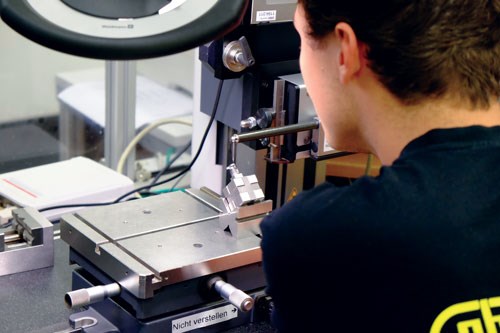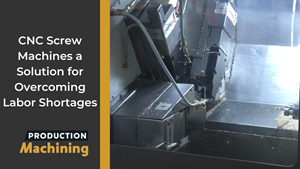The Real Truth About the Skilled Workforce Issue
"The workforce and finding skilled people are our shop's biggest problems." I hear this line from almost every shop I visit.
"The workforce and finding skilled people are our shop's biggest problems." I hear this line from almost every shop I visit. I hear it in Minnesota, Illinois, California and right at home in Ohio.
I heard it at the Steering Committee of the Syndicat International du Decolletage (SID) in Dublin, Ireland, from delegates from Sweden, Germany, France and Switzerland.
The lack of a skilled workforce is a "glocal" problem. That is, it is a global problem, but it is one that can only be solved locally. It is time that we, as manufacturers, recognize the fact that there is not a pool of already skilled workers available somewhere, but we just can't seem to find them. It is time for us to admit that the schools are not going to be sending us qualified workers en masse any time soon.
I think that it is time for us to acknowledge that we own this problem, and it is up to us to solve it. And solving just might mean changing the way that we think about our workforce.
"Cooperate to graduate."
I visited Paul Horn GmbH in June during its Technology Days event at its factories in Tubingen, Germany. Horn's purpose was to showcase its technology. My purpose was to learn what the company does to keep its workforce up to the challenges of its advanced technology and company growth.
The answer, I found, was not, "Beggar thy neighbor." It was not about poaching staff from the company next door. In fact, one of the things it does is share classrooms and programming focused on tool production with a neighboring company. This reminded me of a saying my daughter had from her years at West Point: "Cooperate to graduate." By cooperating with other companies in their market niche and neighborhood, Horn helped to create a program for creating toolmaking certified talent in its local area. Getting qualified skilled workers does not have to be "I win, you lose." It is not about zero sum. Working together to solve our common problems, locally, can make all parties more successful. It's glocal.
Employees are the most important investment.
What is the role of the employees in your organization? I have worked in shops where an employee was nothing more than someone to "do the work," and that was it. If the employee had an idea, so what? Management was where the ideas come from. I bet you have worked there, too.
I have also worked at places, and managed them, where the employee was considered to be the "local expert," whose opinion held weight because of their deep process knowledge. Places where failed attempts to improve a process or procedure were celebrated, because we now knew of one more thing that doesn't work. A little bit more about our process.
Perhaps you don't think of employees as an "investment." Fair enough. They are certainly an "asset." Regardless of whether you consider employees to be an investment or an asset, I am certain that we can all agree that we would like them to grow. Who doesn't want their investment or asset to grow?
If we do not give them the chance to grow, how will we ever get improved performance?
I will not ask you about your plans to grow your employees. Who cares about plans? What I will ask you is, "What is your process to advance the knowledge and capabilities of the talent on your team?" PMPA members routinely send key personnel to national technical conferences, minitechnical conferences, management update meetings and local meetings to help them stay current on developments in our craft. And PMPA recognizes their growth and development by granting CEU credit for their participation and attendance.
What is in your company's best interest?
Not many of our member companies today are limited to using cam-automatic single- and multi-spindle screw machines. The majority of our members also use various CNC technology-based machines, and a significant portion are in the Swiss and multiple-axis (five-axis and above) machining arena. These companies recognized long ago that the market demanded more and more capabilities than they already had. So, they upgraded technology and talent. It is obvious to anyone who has been to our PMTS show in Columbus, or any other machine tool exhibition, that the market continues to demand upgraded technology if we are to remain competitive and viable to serve our customers.
How can we meet the demand for upgraded technology if we haven't upgraded the skills of our team? We can only meet the market's ever-increasing demand by upgrading the skills and knowledge of our workforce and the technology that they apply. Again, I don't want to know about your plan. Tell me about all your processes to upgrade the skills of your workforce.
What is our job?
What is our job as managers, owners and leaders of people? In business school, they talk an awful lot about, "You get what you measure." What do we measure? Do we measure training hours? Per employee? Per million in sales? Per million in capital investment? Do we measure the growth in skills and competency of our workforce? On what basis?
Continuous improvement is undeniably our job as owners, managers and leaders in our shops. If we are not improving, we are falling behind. How do you measure the continuous improvement of the people and processes under your authority? What is your process for continuous improvement? Can you show me the policy, the procedure or the work instruction? Lothar Horn told me that his philosophy is, "The best people are the basis for the future." And he showed me 118 pages in two volumes of available training for all employees.
Our job as managers, owners and leaders is, "to help our people become the best." I have posted elsewhere on the mistaken fear that many of us share, "What if I train them and they leave?" My response, and one that I am sure is shared by Mr. Horn is, "What if I don't train them and they stay?"
We have a glocal skilled workforce problem. What are you doing to solve this issue? Are you doing it alone? Are you waiting to be rescued? By whom? The best people are the basis of the future. If we do not give them a chance to grow, how will we get continuous improvement and improved performance?
Related Content
Succession Planning: Three 15-Minute Activities to Start Preparing for Tomorrow
Succession planning is planning for the future success of your business.
Read MoreVideo Tech Brief: CNC Screw Machines a Solution for Overcoming Labor Shortages
CNC screw machines can exceed job shop productivity and enable manufacturers to overcome perpetual employment gaps.
Read MoreJob Candidate Questions and What They Tell Us
Individuals who ask thoughtful, original questions in the interview set themselves apart.
Read MoreGift a 3D Printer to an Employee?
Some shops have purchased inexpensive polymer 3D printers for their operations. Does it make sense to take this a step further and give (or loan) a sharp young employee one to experiment with at home? This small investment could pay off for your shop in different ways.
Read MoreRead Next
A Tooling Workshop Worth a Visit
Marubeni Citizen-Cincom’s tooling and accessory workshop offers a chance to learn more about ancillary devices that can boost machining efficiency and capability.
Read More5 Aspects of PMTS I Appreciate
The three-day edition of the 2025 Precision Machining Technology Show kicks off at the start of April. I’ll be there, and here are some reasons why.
Read MoreDo You Have Single Points of Failure?
Plans need to be in place before a catastrophic event occurs.
Read More























